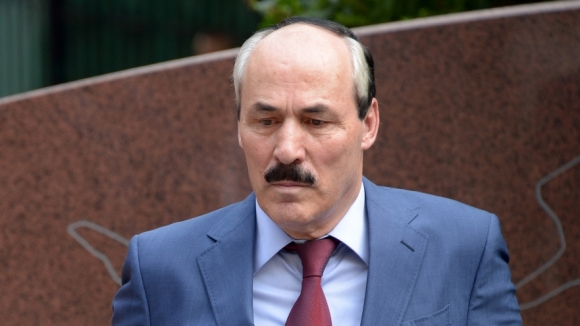
Abdulatipov’s Staff Selection in Dagestan Reflects His Clan Base
Publication: Eurasia Daily Monitor Volume: 11 Issue: 8
By:

Ending Dagestan’s convoluted clan system is widely cited as the reason why Moscow dispatched Ramazan Abdulatipov to rule this large and violence-ridden North Caucasian republic one year ago. Over time, however, observers started noticing that Abdulatipov himself was gradually building his own clan as his attempts to work with the existing staffers failed. Abdulatipov comes from the mountainous district of Tlyarata in the republic’s southwest, on the border with Azerbaijan and Georgia. Tlyarata is over 99 percent ethnic Avar, which is Abdulatipov’s ethnic group. Predictably, some of Abdulatipov’s closest associates come from this district. Since Avars are the largest ethnic group in Dagestan, the true marker of ethnic kinship for this group is often the district or the village rather than simply being a member of the Avar ethnic group.
An investigation conducted by Dagestani journalist Rajab Magomedov and published by the Kavpolit.ru website found that the person from Tlyarata district with the highest position after that of Abdulatipov is Ramazan Aliev, head of the republican presidential and governmental administration. Similarly to Abdulatipov, Aliev also primarily advanced his career outside Dagestan—in Saratov region, where he worked in various law enforcement agencies. Abdulatipov represented the Saratov region in the Russian Federation Council in 2000–2005. Abdulatipov and Aliev have apparently retained their ties from that time (https://kavpolit.com/glava-dagestana-i-tlyaratincy/).
Another well-positioned person from Tlyarata district is Alibeg Aliev, who is currently head of the department for internal affairs and development of territories in the republican presidential and governmental administration. Aliev ran Abdulatipov’s office in Dagestan after Abdulatipov became a Russian State Duma deputy in 2011. When the latter became a deputy in the Russian State Duma in 2011, Aliev reportedly said: “We fellow compatriots have no right to let him [Abdulatipov] down, we need to become better organized throughout.” At the same time, Aliev denied that Abdulatipov was advancing his own men in the government. Magomed Musaev, the head of the executive committee of the Dagestani president’s Strategic Council, comes from Charoda district, which is next door to Tlyarata. Musaev is reportedly Abdulatipov’s son-in-law. Earlier, Musaev headed the All-Russian Exhibition Center in Moscow (VDNKh) and is believed to have substantial financial resources (https://kavpolit.com/glava-dagestana-i-tlyaratincy/).
The impressive influx of people from Abdulatipov’s home district into the Dagestani government does not necessarily mean that the newly appointed head of the republic is inherently corrupt. Rather, it means that in the absence of participatory political mechanisms, the only viable way to govern this territory is to construct another relatively closed circle of officials and practically mimic the previous system of clans, with some modest modifications. When observers criticize North Caucasians for sticking to their clans, they tend to forget that North Caucasians live in small communities and have strong ethnic identities. This combination of size and ethnicity makes the social networks in the North Caucasus quite important. Given the virtual absence of public politics thanks to Moscow’s de-facto ban on popular elections, the result is that social networks are essential for both the rulers and the ruled.
In November 2013, Abdulatipov abruptly announced the creation of four mega-districts in Dagestan, dividing the republic into four areas—North, South, Central and Mountainous (https://www.dagpravda.ru/?com=materials&task=view&page=material&id=34797). The city of Kizlyar was designated the seat of the administration of the Northern District; the city of Debent was reserved for the Southern District; the capital of the republic, Makhachkala, was named the administrative center for the Central District; and the village of Khunzakh was named the center of the Mountainous District. Abdulatipov’s appointees in connection with these districts raised a few eyebrows. For example, the mayor of Kizlyar city, Vyacheslav Palamarchuk, was appointed as the representative of the head of Dagestan in the Northern District. Only a month earlier, in October 2013, Palamarchuk was accused of embezzling $500,000 in government funds. Musafendi Velimuradov, who was appointed as Abdulatipov’s envoy to the Southern District, was known for conflicts with businessmen over the division of spoils at the Yarag-Kazmalyar border checkpoint with Azerbaijan. Ibragim Ibragimov, who was appointed to the Mountainous District, reportedly is an individual from the Russian security services who has no governing experience. Perhaps the only Abdulatipov envoy who does not evoke either negative or positive comments from Dagestani observers is Shamil Zainalov, a Dagestani parliament’s deputy who was appointed to the Central District (https://ndelo.ru/politika-5/2586-namestniki-abdulatipova).
Moscow’s struggle to install order in Dagestan without giving Dagestanis the power to rule themselves shows how hard it can be despite the fact that the central government is so much more powerful than any regional government. The multitude of small ethnic groups in Dagestan, which are subdivided into clans, are so hard to govern that even appointees of Moscow, with the resources of the central government behind them, eventually have to replicate the existing clan structure of Dagestan in order to stay in touch with the society they rule.




